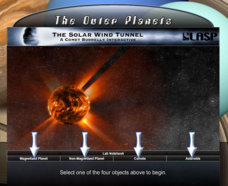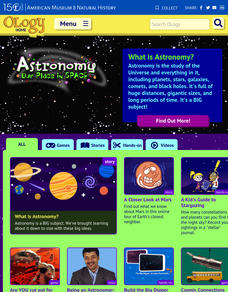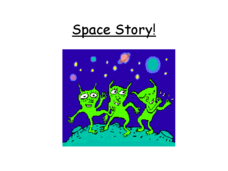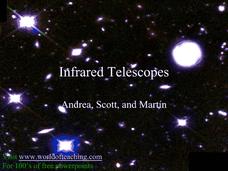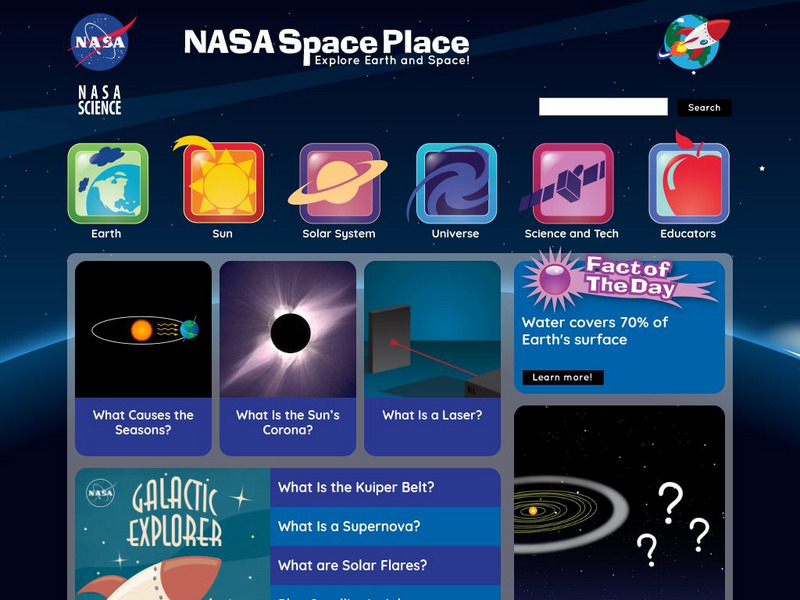Scholastic
Study Jams! Our Solar System: Outer Planets
A set of seven slides presents an artist's rendition of our solar system, specifically, the asteroid belt, Kuiper Belt, and our outer planets: Jupiter, Uranus, and Neptune. The slides are beautiful, and a printable set with text is...
Glynn County School System
The Outer Planets
Are outer planets just like inner planets? Nope! The outer planets are much more spread apart than the inner planets. An informative PowerPoint presentation shows why this is true as well as facts about the individual planets in the...
Scholastic
Study Jams! Our Solar System: Inner Planets
Stunning images make up this slide show on the inner planets of our solar system. While visiting Mercury, Venus, Earth, and Mars, viewers also are introduced to the International Space Station and the Spirit Rover on Mars. Follow this...
Glynn County School System
Solar System Formation and Extra-Solar Planets
Has the solar system always been like it is today? A lesson presentation begins with a discussion of the formation of our solar system. It continues with a compare and contrast of the inner and outer planets.
Glynn County School System
Our Solar System: An Introductory Tour
Take science lovers on an out-of-this-world tour of the solar system. A PowerPoint presentation gives a pictorial view of the planets of the solar system. Images highlight the unique features of each planet, and the final slides include...
Laboratory for Atmospheric and Space Physics
The Solar Wind Tunnel
The winds of change are blowing in our very own solar system! But what makes some heavenly bodies more affected by solar winds than others? Pupils discover the concept of magnetic forces at work in space in this...
Laboratory for Atmospheric and Space Physics
Orbit Simulator
Researchers think they have evidence of a new planet deep in our solar system that is the size of Neptune and orbits the sun far beyond Pluto. The orbit simulator shows the orbits of our well-known planets, as well as Pluto and the comet...
American Museum of Natural History
Planetary Mysteries
Get to know our little part of the vast universe. Learners read about the common and not-so-common facts about each of the planets in the solar system. The interactive lesson includes a large amount of information as well as a quiz to...
Mr. E. Science
Our Solar System
The presentation starts with the scientists who made discoveries about our solar system: Ptolemy, Copernicus, Galileo, Brahe, Kepler, and Newton. It also covers the planets, inner, outer, and Pluto, satellites, and an in-depth discussion...
American Museum of Natural History
Planetary Mysteries
A website all about planetary mysteries—it's a one-stop-shop for all things, stars, planets, and space travel. Scholars read an astronomy overview to discover the page's big ideas, then choose from the plethora of resources, including...
American Museum of Natural History
What Do You Know About Astronomy
Develop an understanding of the universe. Learners answer 10 multiple choice questions about several topics in astronomy. Questions contain information about the age of the universe, gravitational attraction, galaxies, planets and comets...
PBS
Map a Model Solar System
Creating a solar system map is a snap thanks to a hands-on activity! Science scholars explore the solar system by building it wherever they choose during an interactive from PBS's Space series. Users pick both the location and scale for...
Curated OER
Space Story
This presentation is designed to lead young writers to create a simple story about going into outer space. Through a series of basic questions, pupils should be able to compose a story about space.
American Museum of Natural History
Cosmic Connection
Do you see what I see? Individuals view eight images from the Hubble Space Telescope and then determine exactly what is being shown in the images. The pictures range from the rings of Saturn to views of billions of galaxies that take up...
Mr. E. Science
The Earth in Space
Do you think Earth makes fun of other planets for having no life? The presentation covers the rotation and revolution of both the earth and our moon. It provides explanations for seasons, tides, and eclipses. Lesson is the 20th in a...
Laboratory for Atmospheric and Space Physics
Explore Saturn and Titan with Spectral Data
Titan is Saturn's largest moon and has its own atmosphere. An attention-grabbing tutorial allows learners to analyze the spectrum of Saturn and Titan to determine their elemental compositions. Scholars compare a known element's spectrum...
CK-12 Foundation
Field Lines
The earth has a giant magnetic field caused by the liquid iron that constantly moves in the outer core. Scholars explore the magnetic fields of four different planets. The strength and alignment of the poles relates to the implications...
CK-12 Foundation
Journey to Mars
Why are there launch windows when traveling to outer space? Scholars explore the trajectory of traveling from one planet to another. By adjusting the departure and destination planets, as well as the launch date, they observe the ideal...
Curated OER
Infrared Telescope
Most of the twenty slides in this presentation include photographs or diagrams, making it an eye-catching way to teach about infrared telescopes. The pros and cons of using infrared light to study outer regions of space are explained....
Curated OER
Exploring Jupiter: Galileo Curriculum Module Issue One
In this exploring Jupiter: Galileo Curriculum Module issue one activity, students complete a crossword puzzle that tests their knowledge of Jupiter; their are 11 links to other worksheets to explore the planet.
Glynn County School System
Our Sun
The sun is responsible for almost 99 percent of the solar system's mass. As an essential part of our lives, the sun has many important features. A PowerPoint lesson presents information about features such as sunspots, the magnetic...
American Museum of Natural History
The Amazing Mundo
Rocks and minerals are great on their own, but they also turn into some pretty amazing stuff! An online lesson explains the different types of materials we get from rocks and minerals, including glass, plastic, and coins. An embedded...
Space Telescope Science Institute
Space Telescope Science Institute: Hubble Site
Explore the universe and celestial phenomena made visible by Hubble. High-quality photos of planets, stars, nebulae, and galaxies, complete with individual descriptions, can be viewed online and downloaded for printing and personal use.
NASA
Nasa: The Space Place
This site from the National Aeronautics and Space Administration allows students to explore topics related to planet earth and outer space. A number of games and interactive features are available.




